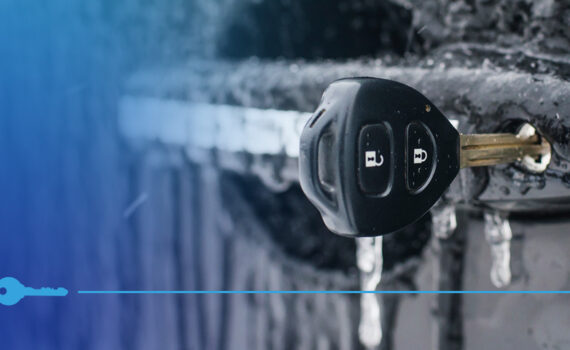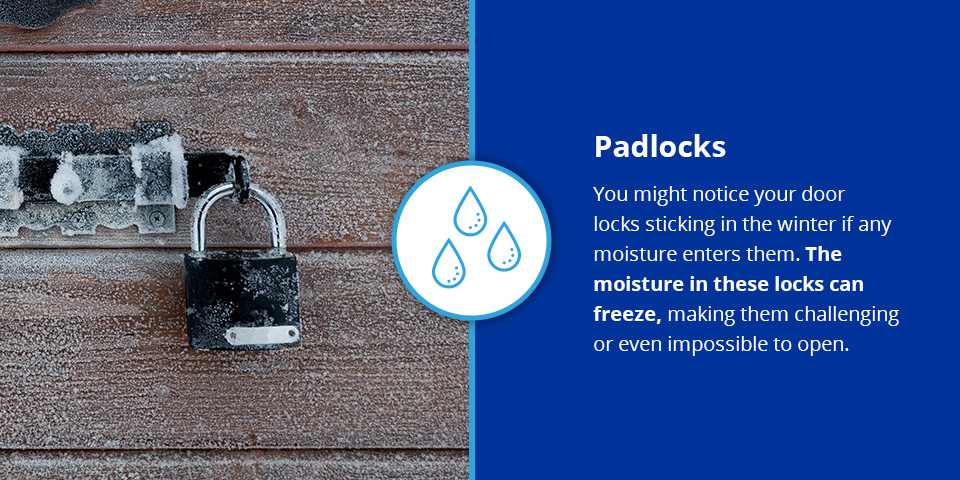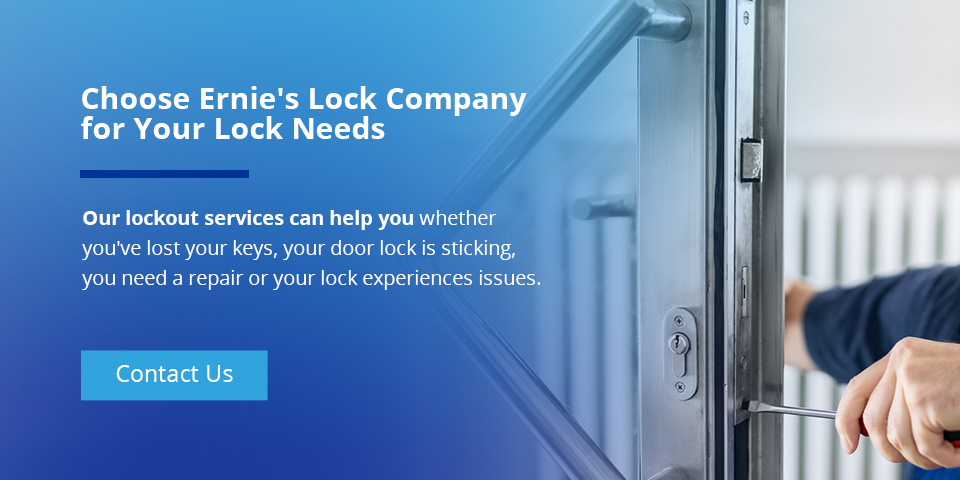
How Changes in Temperature Affect Locks
Many times, people consider the importance of locks when they’ve already stopped functioning the way they should. Often, one of the biggest perpetrators of lock problems is changing weather. Locks of all kinds can experience significant changes as the weather cools down or warms up, which can impact your security.
Vehicle locks, deadbolts, keypads and padlocks can face locking mechanism issues throughout the year, especially when extreme weather shows up. You might have difficulty opening the lock, the locking mechanism may fail or you may break your key during the turning process.
Hot Weather Changes
During the summer months, humidity and moisture can impact doors — even small changes can have a big impact on the function of your locks.
Swelling
Businesses and homeowners often experience jams during the hotter months, often on exterior doors. For example, if you have a wood or plastic door, the material may warp or swell, which can impact the connecting lock. Swelling impacts lock alignment because the geometry of the frame and door change while the lock tries to stay in place. Deadbolts may be especially challenging to open if the door frame swells because they can get stuck in one position. These locks become compressed in these circumstances, making it difficult to move the lock at all.
Sticking
Metal door locks can also face unique challenges in the summer. As the warm weather causes any lubricant to evaporate, the lock mechanism may get stuck as metal components expand. Although adding lubrication can reduce some lock issues, you won’t easily fix the problem if expansion occurs.
Cold Weather Changes
As temperatures begin to drop, you can also face some unpleasant lock issues.
Shrinking
For wood doors, the material may start to contract rather than swell. Although this process is the reverse of swelling, the outcome is the same — changes in the door and frame cause a lock misalignment. The results of this shrinking may also make it harder for the key to catch in the lock.
Freezing
An additional problem you could face involves the freezing point of any lube you use on your locks. Although lubrication can make it easier to turn your locks, it stops being effective once it reaches the freezing point. If the lubricant freezes, or if any excess water freezes in the lock, the ice can prevent components from moving. Attempting to continue trying the lock in this state could result in structural damage or cause your key to break in the lock.
Additionally, your key may stick in the lock, or you may not be able to insert it at all if there is a lot of frozen buildup. Learning how to prevent locks from freezing is crucial for avoiding these issues.
Changes for Different Types of Locks
Many locks function in similar ways, but some can face unique challenges in different temperatures. Keep reading to discover when specific locks may be more susceptible to issues.
Car Locks
Vehicle locks can become very sensitive in the winter months. When temperatures drop to freezing and below, moisture inside the lock and mechanism can freeze. This issue can prevent you from inserting your car key or using your remote door opener.
Padlocks
Common on garages, sheds and fences, padlocks face the biggest challenge when temperatures drop. You might notice your door locks sticking in the winter if any moisture enters them. The moisture in these locks can freeze, making them challenging or even impossible to open. Additionally, if you don’t use the space your padlock is protecting very often, it may face issues over time from a lack of preventative maintenance. For example, if you never lubricate the lock, the summer heat may cause additional problems for metal components, such as causing them to shrink or become brittle.
Keypads
As keypads and other keyless locks grow in popularity, it’s essential to understand their unique issues. Many commercial spaces use keyless locks, which can impact business operations if they stop functioning. These locks don’t face the same problems as other lock types. Instead, they face mechanical issues, push button jams and battery drain problems.
While most all-weather locks will function in any weather condition, they may face issues under extreme pressure. This type of pressure can lead to mechanical issues that may prevent the mechanism from working. Additionally, cold weather can affect keyless entry. Prolonged exposure to extremely cold temperatures can lead to shorter battery life spans. Typically, these batteries can last up to a year or longer in normal conditions, but a harsh winter can chop this timeline severely. If the battery dies and you don’t have a backup to get it running again, you might be stuck outside.
Deadbolts
When functioning normally, deadbolt lock mechanisms retract when you place and twist your keys inside. Alternatively, the mechanism extends when you lock it. As we mentioned above, you may notice difficulties in the summer months if your door warps or swells, causing a misalignment of the components that extend and retract the bolt.
Best Practices for Reducing Weather Impacts
Regardless of the type of locks you use, there are several tips you can keep in mind to ensure their longevity and your safety and convenience. Check out these best practices:
- Consider replacing plastic or wood doors with more durable and resistant options.
- Create and follow a routine maintenance schedule, such as adding lubrication.
- Keep your locks as dry as possible by using overhanging or protective coverings to keep snow and moisture out and prevent door swelling in the summer.
- Warm your key with your hands before inserting it into a lock in the winter.
- Hire a reliable and professional locksmith when installing new locks or addressing a lock concern.
Choose Ernie’s Lock Company for Your Lock Needs
At Ernie’s Lock Company, we provide full-service locksmith services to Maryland and D.C. Metro residents and business owners. Our company has been offering professional service since 1960, giving us decades of experience in the industry. We can handle any job, big or small. Whether you need a lockout service for your car, business or home, or need a new lock installed, we’ve got you covered.
Our lockout services can help you whether you’ve lost your keys, your door lock is sticking, you need a repair or your lock experiences issues in extreme weather. We provide upfront and fair pricing along with friendly and quick service, so you can get back on schedule as conveniently as possible. If your door lock isn’t working, don’t worry! Contact us for any lock service you need. We’re happy to help!


